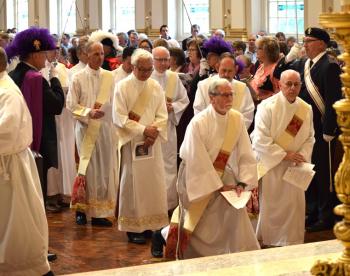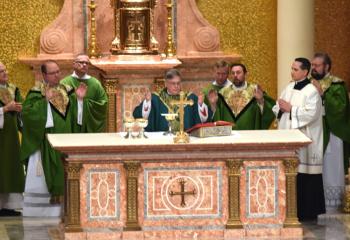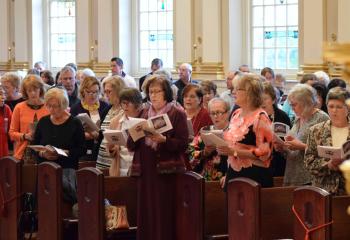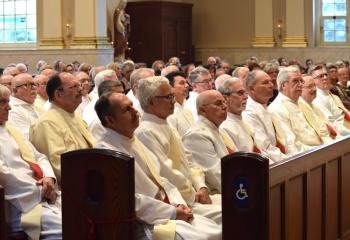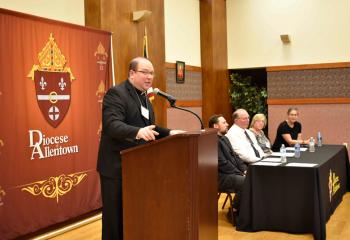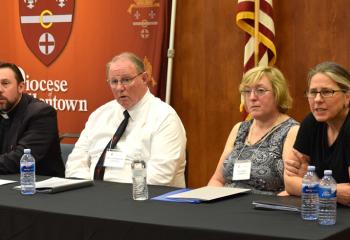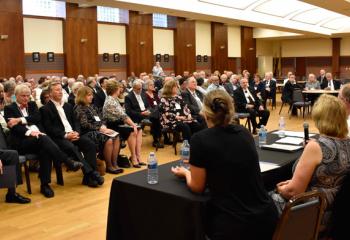By TAMI QUIGLEY Staff writer
The 2018 Convocation of the Order of the Holy Order of Deacons was a day of prayerful reflection and discussion for permanent deacons and their wives in the Diocese of Allentown, as the Sept. 22 convocation at the Cathedral of St. Catharine of Siena, Allentown, spotlighted the golden anniversary of the permanent diaconate.
Father Eugene Ritz, director of the Office for Permanent Diaconate Formation, said 2018 was the golden anniversary of the letter “Restoration of the Permanent Diaconate in the Latin Church” (“Sacrum Diaconatus Ordinem”) in which Pope St. Paul VI restored the order in 1968.
The document was issued in 1967, but took effect in 1968. Different Dioceses implemented the program at different times; the first class in the Diocese of Allentown was ordained in 1982.
Father Ritz is also Diocesan chancellor and chaplain of Notre Dame High School, Easton.
To date, a total of 166 men have been ordained to serve the Diocese as members of the permanent diaconate. There are 108 active deacons in the Diocese, and 17 additional deacons are retired but often serve in some capacity. The deacons serve in various capacities, many in parishes.
The number of deacons ordained in each class are: 1982 – 26, 1990 – 21, 1995 – 20, 2000 – 22, 2006 – 30, and 2015 – 47.
Deacon Peter Schutzler, assistant director for the Permanent Diaconate, who serves St. Ann, Emmaus, said the Holy Order of Deacon is the first of the three clerical orders in the Roman Catholic Church.
Deacons can be married and must be married prior to receiving the Sacrament of Holy Orders. If a deacon’s wife predeceases him, he must remain celibate as he continues his ministry as a deacon.
Single men may be ordained to the permanent diaconate, but make a promise of celibacy at their ordination and live a celibate life after their ordination.
“Deacons have a unique and important role in the Church, as being a deacon goes beyond the functions of a deacon. Deacons are more than simply a sum of their many functions. Deacons are called to represent Christ the Servant,” Deacon Schutzler said.
“Their ministry is one of word, sacrament and charity. What allows them to serve most effectively as deacons is being close God in prayer and also close to the community. Deacons are called to bring the needs of the people to the Church.”
Deacon Schutzler said as ordained clerics in the Church, deacons are ministers of word, proclaim the Gospel, preach and teach the faith.
As ministers of sacrament, deacons baptize, lead the faithful in prayer, witness marriages, and conduct wake and funeral services.
As ministers of charity, deacons are leaders in identifying the needs of others, then marshaling the Church’s resources to meet those needs.
“Deacons are also dedicated to eliminating the injustices or inequities that cause such needs. No matter what specific functions a deacon performs, they flow from his sacramental identity. In other words, it is not only what a deacon does, but who a deacon is, that is important,” he said.
Deacon Schutzler welcomed those gathered to the convocation event that kicked off in the early afternoon. Father Ritz offered the opening prayer.
Keynoter Dr. Carmina Chapp, program director for Online Theology Programs at St. Joseph College, Standish, Maine, presented “Be Perfect as Your Heavenly Father is Perfect” (Matthew 5:48). St. Joseph is the college contracted to assist in the Intellectual Formation of the diaconate class in formation.
Two breakout sessions followed the keynote: “The Rule of the Wife of a Deacon,” presented to the women by Chapp and Kathy Schettini, wife of Deacon Bruno Schettini of St. Joseph the Worker, Orefield; and “My Introduction to the Diaconate,” presented by Deacon Rick Lanciano of St. Ignatius Loyola, Sinking Spring, and chair of the Theology Department at Berks Catholic High School, Reading.
An ensuing panel discussion featured Diocesan Secretary for Clergy Father Adam Sedar, Deacon Lanciano, Chapp and Kathy Schettini.
Bishop Alfred Schlert was main celebrant of the Saturday evening Vigil Mass.
Concelebrating were Father Ritz; Father Sedar; and Father Brendan Laroche, assistant pastor of the Cathedral.
Father Keith Mathur, assistant in the Diocesan Curia and director of the Diocesan Office for Divine Worship, was episcopal master of ceremonies.
Assisting were Deacon Schutzler and Deacon Isidro Gonzales-Rivera, assistant director for Hispanic Outreach in the Office for Permanent Diaconate Formation.
A reception and dinner ensued.
“I am excited to begin formation with our new class and serve the deacons already ordained in terms of ongoing formation,” said Father Ritz. “More than 20 men have been accepted for the new class, and they will be in formation for six years.” (Click here to read the article 'A New Permanent Diaconate Class is on the Horizon for the Diocese')
The late Monsignor James Mulligan and Monsignor Michael Chaback, in residence at Queenship of Mary, Northampton, are past directors of the office.
Former assistant directors are the late Deacon Francis Cosgrove; Deacon Henry Gordon of Breinigsville, retired; Deacon Gerald Schmidt, who serves St. Theresa of the Child Jesus, Hellertown and is manager of the liturgical warehouse for the Diocesan Office for Pastoral Planning; and Deacon William Urbine, who serves Notre Dame of Bethlehem.



